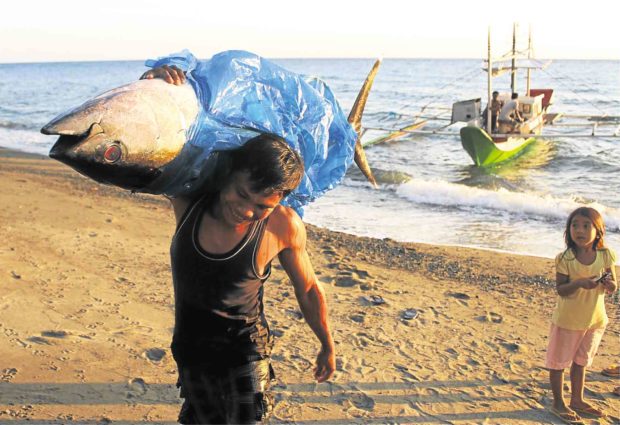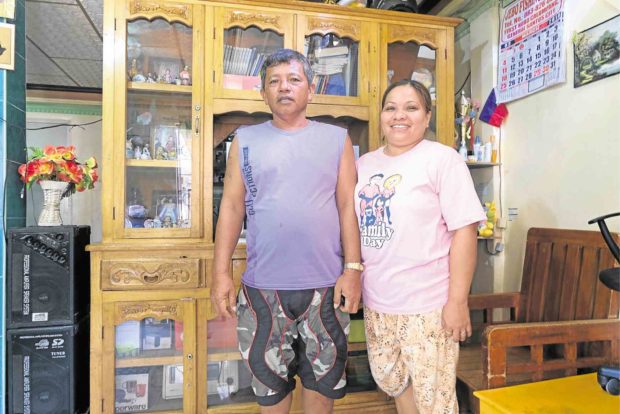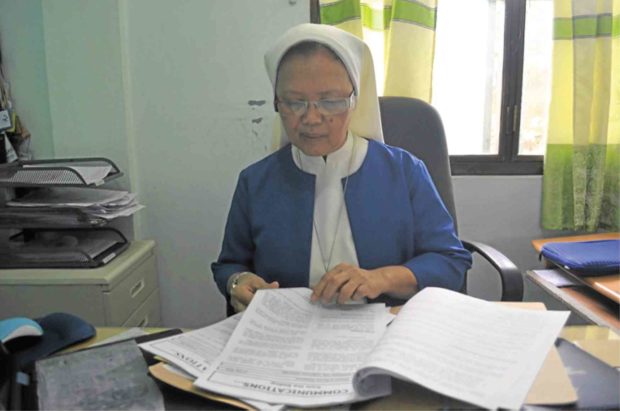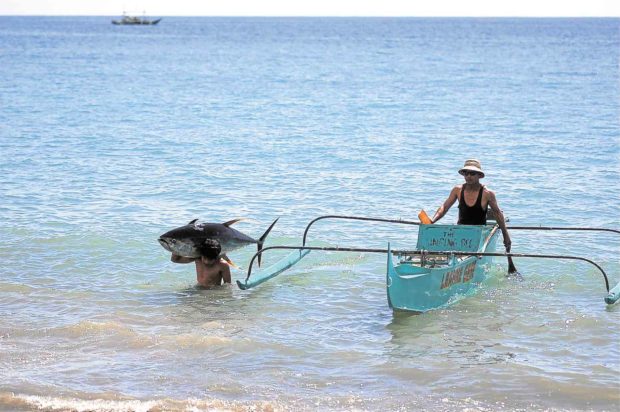Help center for jailed fishers

FISHING TRIP In this file photo, a fisherman from Kiamba town, Sarangani province, unloads his team’s catch of yellowfin tuna after a five-day fishing trip in Celebes Sea. —KARLOS MANLUPIG
GENERAL SANTOS CITY—For more than a year, Melencio Cobeta endured the difficulty and loneliness of being jailed in a foreign country.
“It was a nightmare for me,” said Cobeta, the skipper of a Philippine-flagged tuna fishing boat who was arrested along with more than 20 Filipino fishermen in May 2016 in Indonesia on charges of illegal fishing.
Indonesia has waged a literally explosive campaign against illegal fishing since Joko Widodo assumed the presidency in 2014, blowing and sinking hundreds of foreign vessels illegally fishing in its waters.
The world’s largest archipelagic nation is known for its rich marine resources, including large and mature tuna species sought after by restaurants and consumers in Japan and the United States.
Filipinos and other foreigners caught encroaching on Indonesia’s fishing grounds are usually held at Bitung City in North Sulawesi.
Bitung is about a day’s travel by boat from General Santos City, where Cobeta’s family lives and dubbed the “Tuna Capital of the Philippines.”
“As prisoners, we were made to carry big rocks, cut grasses and paint prison facilities without pay,” Cobeta told the Inquirer in an interview at his home here.
Family sufferings
His wife, Esterlita, and three children suffered financially and emotionally.
“His imprisonment was the greatest trial we encountered as a family,” Esterlita said. “We sold our cows and our motorcycle so we can sustain our needs while he’s in jail.”
She added that she borrowed money from loan sharks “just so we can get through tough times.”
Cobeta, a high school dropout, has depended on the bounties of the sea for livelihood.
He has been a tuna fisherman for more than three decades and often spends months with other fishermen at sea away from their families to catch the high-value fish.
But landing in jail in a foreign land was a totally different cross to bear for them; it curtailed not only their liberty but also degraded their dignity for being “lawbreakers.”
When her husband was detained, Esterlita was forced to work for their family’s survival. She grilled and sold bananas in her neighborhood, earning only P100 a day.
AOS assistance
Eager to have their family together again, she sought all means for Cobeta to return home.
Eventually, she was introduced to Apostleship of the Sea (AOS), which manages Stella Maris Seafarers’ Center at the General Santos seaport.
Oblates of Notre Dame’s Hesed Foundation Inc. has been running AOS since 2006, providing spiritual or pastoral services and psychological support to poor fisherfolk in the city and neighboring areas, as well as seafarers of commercial vessels making port calls.
AOS is the port ministry of the Catholic Church that started in the 1920s during the time of Pope Pius XI.
AOS-GenSan is the country’s 10th and 417th in the world.
“Many of these mariners would stay in the high seas for six months without hearing a holy Mass. Often, commercial seafarers on a brief port stopover here would request for a Mass. What we do is we look for an available priest to say Mass aboard the ship,” said Sister Susan Bolanio, Hesed Foundation executive director.
“We also hold prayer studies with them to nurture their spiritual growth,” Bolanio said.
The center largely assists distressed tuna fishermen, especially those imprisoned in Indonesia for illegal fishing.
Over the past six years, it has helped in the repatriation of at least 400 jailed fishermen, Bolanio said.
Abandoned by employers
As many of these jailed fishermen were poor and abandoned by their employers, their families sought the help of the center for their repatriation, the nun said.
Basically, the center serves as a link between the Department of Foreign Affairs and the families.
Once it obtains documents, such as marriage or village certificates proving the Filipino identities of those jailed, it provides these to the Philippine consulate office in Manado, North Sulawesi, for processing as part of repatriation.
At least two fishermen died of sickness while in detention, but they were reunited with their families here with the help of the center, AOS records showed.
In some cases, the tuna fishers who were repatriated from Indonesia arrived in Manila but were stranded for a few months at state-run welfare facilities because of lack of funds to send them home.
“We look for sponsors to pay for their airfare so they can be reunited with their families,” Bolanio said.
Cobeta was reunited with his family in August 2017, and has since resumed tuna fishing.
His wife lauded the Oblates nuns for coming to the rescue of the distressed Filipinos.
“The center offered us hope during that dark episode of our lives. Knowing that somebody was helping gave us the strength to tide the ordeal, that one day we will be reunited together again as a family,” Esterlita said.


